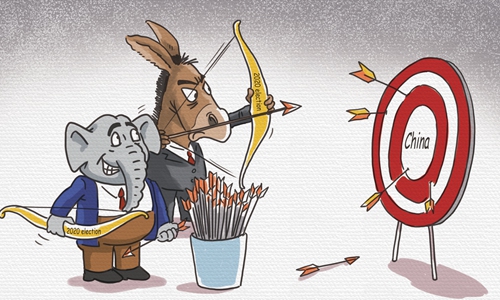US election sees China bashing by both parties
By Shen Yi Source:Global Times Published: 2020/4/22 19:48:40

Illustration: Liu Rui/GT
Former US vice president Joe Biden has launched a counterattack on President Donald Trump in his latest presidential campaign ad to accuse Trump of caving in China over the COVID-19.The 2020 US presidential election campaign has seemingly turned into a political show to see who can be tougher on China and hold it culpable for COVID-19-related harms, as both the pro-Trump and pro-Biden teams used their campaigns in a key battleground - slamming their rivals for their positions on China regarding the COVID-19 pandemic and other affairs.
Many US politicians, including Democrat Rep. Jim Renacci, anticipated that China would continuously be a hot-button issue that dominates the US presidential campaign.
As a political system touting democracy, it is ironic that heated exchanges on domestic policies have sometimes been drowned out by the catharsis of a crusade against China, turning the election into a botched vote-grabbing game that drags on US strategic resources and its prestige in the world.
The ill-prepared election campaign reflects how US global influence and leadership is collapsing.
While Trump was blamed for his administration's incompetence in providing enough medical supplies to save lives, and for his suppression of information amid the epidemic and his racist remarks, Biden found a new angle to fight back against his competitor - accusing Trump of being too soft on China over the novel coronavirus epidemic, in response to the Trump campaign team's "#BeijingBiden" ad accusing him of keeping a cozy relationship with China.
Both the Republicans and Democrats pointed their fingers at China in their campaign ads, which exposed the loopholes in the US political structure and even its overall political ecology. Their campaign tactics, controlled by their jingoistic fantasy and biased voices instead of rational debate, also exposed the anxiety of US politicians.
There is a strong populist sentiment in the US, which stems from anger and frustration toward growing wealth and income inequality caused by decades of neoliberal reforms. A responsible politician and presidential candidate is supposed to put tackling social woes as his priority, rather than scapegoating China to be accountable for a US loophole.
In a campaign that turns into a reciprocal attack on who is closer to China, it is easier for voters to become more simple-minded and prejudicial.
Today's US politicians do not really make the right decisions out of rationality, but only make the easy, politically inclined decisions by stirring up and manipulating people's emotions, especially irrational emotions, for the sake of their personal political futures.
The competitive structure of the US election campaign should have been developed around governance, specific policies and solutions to the real problems that the American people urgently need to solve. But unfortunately, the structure has been dismantled and its democratic nature eroded.
The essence of a democratic election in the US is to elect a talented individual who can effectively govern the country. However, in practice, the candidates in the US are politically shrewd to seize power by all means, to marginalize the real needs of the US people and ignore the long-term practical interests of the country, which is completely putting the cart before the horse.
The current US election campaign is cored in bringing down the opponents by attacking and recriminating each other. It has lost the ability to rebuild values and make the country lead the world. If the US has made China as a core target of its election campaign, and the US candidates posture to a more anti-China stance to pin a victory, it is obvious that the US has actually lost its confidence as a hegemonic power.
The author is director at the Research Center for Cyberspace Governance of Fudan University. opinion@globaltimes.com.cn
Posted in: VIEWPOINT